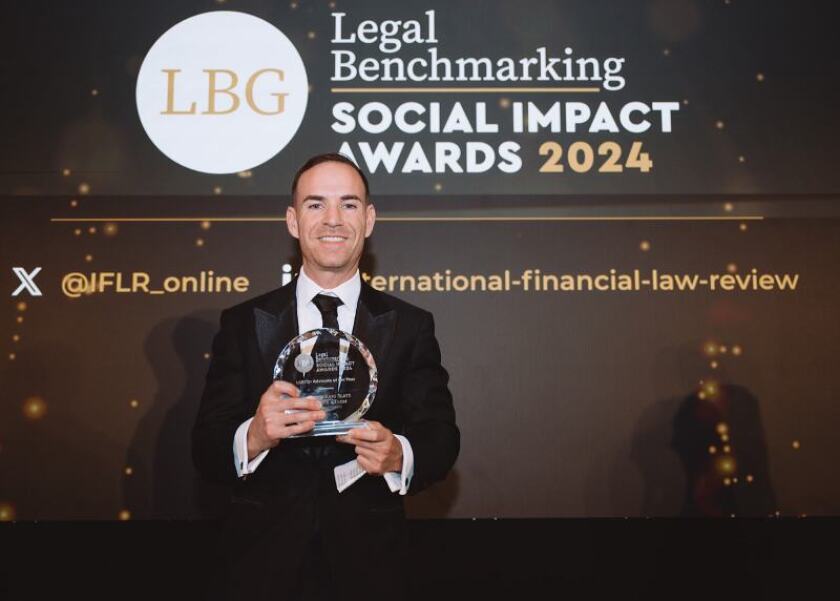The Legal Benchmarking Group is thrilled to recognise and celebrate the recipient of the LGBTQ+ Advocacy Leader of the Year award 2024, Jordan Schwartz, a counsel at Skadden, Arps, Slate, Meagher & Flom in Washington DC.
The inaugural Social Impact Americas Awards were held in a momentous ceremony at the prestigious Metropolitan Club in New York City on June 20 2024.
As a distinguished private practice lawyer, Schwartz has tirelessly championed the representation of the LGBTQ+ community through intentional recruitment efforts, as well as across the wider legal community.
In this insightful conversation, we delve into Schwartz's inspiring journey, groundbreaking work, and vision for a more inclusive future.
How have your background and personal experiences influenced your commitment to DEI and LGBTQ+ advocacy?
The challenges I had to overcome in coming out of the closet are the most significant reason I have dedicated myself to promoting DEI and LGBTQ+ equity. In particular, while my father was supportive of my sexuality at the outset of this process, my mother was not, and she ultimately passed away shortly after my coming out. While I was able to overcome these tumultuous personal and family circumstances, I knew that many others within the LGBTQ+ community had not been as fortunate. As a result, I immediately committed myself to becoming a leader within the LGBTQ+ community, which started with my membership in Skadden’s LGBTQ+ Affinity Network.
What does receiving the LGBTQ+ Advocate of the Year award mean to you, and how do you hope it will inspire others?
Winning this recognition is by far the most important leadership accomplishment of my career thus far. There are many other leaders within the big law community who have been advocating for LGBTQ+ equity, and the fact that the Legal Benchmarking Group selected me as its inaugural LGBTQ+ Advocate of the Year is extremely humbling. Many of my peers at Skadden and throughout the legal community have reached out not only to congratulate me but to ask me what they can do to advance the cause of DEI and LGBTQ+ equity. I am especially hopeful that this recognition will inspire the more junior members of Skadden’s LGBTQ+ Affinity Network to redouble their DEI efforts and to help achieve greater equity in this critical area.
Can you share a particularly memorable moment or story from your advocacy work that highlights its impact on the industry or community?
One recent moment that comes to mind is helping to spearhead an allyship training programme for Skadden’s professional and legal staff last month. The event coincided with Skadden Washington DC’s annual Inclusion Week and featured Michelle Lopez of Paradigm — a DEI company that has worked with more than 1,000 companies around the world to build stronger, more inclusive organisations. I worked with Michelle, other members of the Affinity Network and Skadden’s robust DEI team to tailor the programme specifically to issues surrounding gender identity. Several summer associates reached out to express their appreciation for the event and to emphasise how welcoming Skadden is for LGBTQ+ individuals.
Can you elaborate on your role and accomplishments as the head of Skadden’s LGBTQ+ Affinity Network? Are there specific initiatives you are most proud of?
My role in the Affinity Network has evolved over time. When I came out and first joined the group, I was primarily focused on meeting queer attorneys and allies at the firm and participating in Affinity Network activities. I quickly realised that simply being an active member of the organisation would not suffice and that if I really wanted to promote LGBTQ+ equity within the firm and throughout the community more broadly, I would need to start leading initiatives and started to emulate one of my partner role models at Skadden, Brian Breheny. His leadership on DEI and LGBTQ+ issues at the firm inspired me to become a leader and help mentor some of the more junior members of the Affinity Network.
For example, I supervised a team of Skadden associates in filing an amicus brief in the landmark Bostock v Clayton County case on behalf of the Modern Military Association of America. Several years later, I helped Brian spearhead a programme with Jocelyn Samuels, vice chair of the Equal Employment Opportunity Commission, exploring the impact of the Supreme Court’s landmark ruling in the Bostock case. I also led a virtual screening and panel discussion of the award-winning documentary 'Cured', which highlights the pivotal campaign to fight the American Psychiatric Association’s classification of homosexuality as a mental disorder. And most recently, I helped redouble our outreach to the local Outlaw and Lambda organisations at the Washington DC area law schools to ensure that members of those groups understood that Skadden is a welcoming environment for LGBTQ+ individuals.
How do you balance the need for concrete action with the challenges of changing deep-seated perspectives and behaviours in the workplace?
The greatest challenge is not becoming complacent. I was fortunate to join a firm that has always valued DEI. When I came out and joined the Affinity Network, Skadden was one of just a handful of firms that had a robust LGBTQ+ Affinity Network, not to mention key partner leaders who identified as LGBTQ+. But the fact that Skadden has always valued DEI makes it all the more challenging to come up with ways in which to pursue equity and make the firm even more welcoming. The allyship programme, mentioned previously, is one of those examples that helped educate lawyers and support staff alike about issues related to gender identity – a topic associated with deep-seated perspectives and behaviours in the workplace.
Can you describe your involvement in drafting the amicus briefs for the Supreme Court’s ruling in Bostock v Clayton County and its significance to you?
My expertise as a lawyer is in writing briefs, which entails educating and ultimately persuading judges to side with my client on the facts, the law, or both. And so when the opportunity to become involved in the Bostock litigation arose, I enthusiastically volunteered to use those skills to advance the cause of LGBTQ+ equity. While associates within the Affinity Network took the lead in drafting a brief on behalf of the modern Military Association of America, I helped devise the outline for the brief and ultimately provided comments and edits to the initial draft brief, which helped strengthen the final work product. This process was very rewarding because it afforded me the opportunity to translate my lawyering skills into something tangible for the LGBTQ+ community.
How do you leverage your professional role to influence and support LGBTQ+ equality initiatives outside of your immediate work environment?
I try to champion LGBTQ+ equity in all facets of my professional work. That starts with promoting inclusion within my immediate practice area and motivating others across the firm to take this issue seriously. I’ve tried to advance this important goal by serving several years on the Washington DC 1L Scholars Hiring Committee, becoming a member of the firm’s global DEI Steering Committee and serving on the DC Diversity Committee. Through these roles, I have expanded outreach to LGBTQ+ law students, supported conversations around intersectionality across various affinity networks and supported the Washington DC office’s annual Inclusion Week (which has since expanded to other Skadden offices).
What keeps you motivated and inspired in your advocacy work, especially during challenging times?
I am motivated and inspired by the leaders before me, in and outside the field of law, who championed LGBTQ+ equity – and I hope to help others just as they have helped me.
In your opinion, what role can allies play in supporting LGBTQ+ advocacy within the legal profession and beyond?
Allies play a critical role in supporting inclusion and equity, including LGBTQ+ issues. Skadden, for instance, opens its affinity networks to all attorneys who are interested in participating. The affinity networks facilitate relationship building and play a key role in the firm’s attorney mentoring, professional development, workplace inclusion and social responsibility objectives. Further, I was encouraged from day one to find a cause that sparked my interest and to match that interest to legal needs in our communities. Getting involved with pro bono work that supports LGBTQ+ advocacy is another avenue for allies to make a difference.
How do you see the current landscape for LGBTQ+ rights within the legal field, and what areas do you think need the most attention? What trends do you see emerging over the next few years?
To be sure, a lot of progress has been made in the legal field, as reflected by the landmark Supreme Court decisions holding that gays and lesbians have a fundamental right to marry and that discrimination on account of sexual orientation or gender identity is prohibited by federal law. However, a number of states are curtailing the progress we have made by targeting gender-fluid and non-binary members of the LGBTQ+ community. Many of these individuals are minors and require more robust legal protections, not fewer.
What advice would you give to young LGBTQ+ lawyers or those from underrepresented groups who aspire to leadership roles in the legal profession?
Get involved in your firms’ LGBTQ+ communities, including but not limited to affinity networks, events and pro bono work. Try to figure out what is working and what could be improved upon, perhaps within your immediate practice area to start and ultimately across the firm and industry.
What is one key message you would like to share with leaders and organisations about the importance of DEI across the legal community?
We cannot become complacent. Simply put, we must recommit ourselves to LGBTQ+ inclusion and continue to make strides in this critical area.
The Social Impact Americas Awards were held at the prestigious Metropolitan Club in New York City on June 20 2024. These inaugural awards shone a spotlight on elite firms and individuals that have not only excelled in their respective fields but have also championed inclusion within their workplaces and industries. To view the evening's winners, click here.

